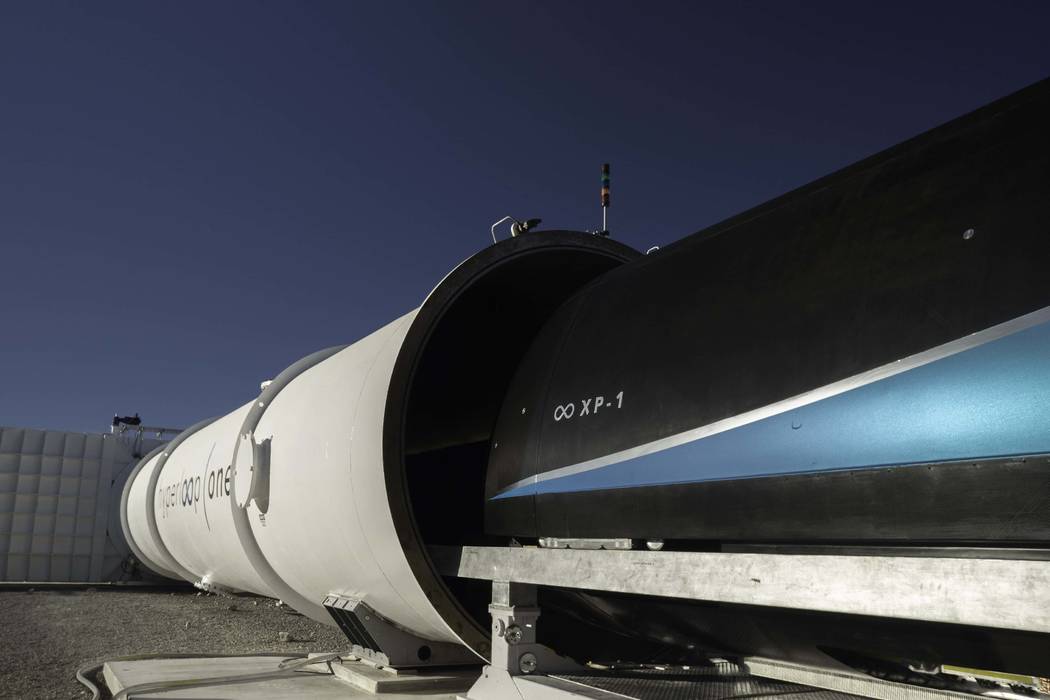Hyperloop testing near Las Vegas generates global interest
Testing of a new high-speed, mass-transit mode happening in Las Vegas’ backyard right now could lead to a new era of transportation.
Virgin Hyperloop One is looking to take the progress the company has seen at their Southern Nevada test track — located 45 minutes outside of Las Vegas — and implement the underground, high-speed transportation model worldwide.
With test speeds reaching up to 245 mph, the company eventually hopes to connect cities as metro stops, which would allow a person to live in say, Columbus, Ohio, and work in Chicago, Hyperloop One spokesman Ryan Kelly said at the Future Travel Experience conference in Las Vegas last week.
“Imagine if you could — in the same time you could go across Chicago in 40 minutes — you could connect Columbus, Pittsburgh and Chicago in under 40 minutes,” Kelly said. “It creates mega regions, versus mega cities.“
The system works like this: A hyperloop pod travels in a low-pressure, underground tube at speeds in excess of 670 mph, largely running next to major highways and within right of ways, allowing for minimal issues when building out the infrastructure needed for such a mass transportation mode.
It would move both people and cargo, since there is a need in both realms, Kelly said. Hyperloop One has raised $372 million, largely between major investors Virgin on the passenger side and DP World on the cargo side.
At peak, the hyperloop could transport up to 16,000 passengers per hour. To make it worth the cost for the average passenger, ticket prices will have to be in line with other mass transit options, Kelly said.
For example, a trip from St. Louis to Kansas City would cost about $30, or about the equivalent of a tank of gas, Kelly said.
A dozen states are in varying stages of hyperloop feasibility studies for their regions.
The Washington Department of Transportation is studying the possibility of linking Vancouver, Seattle and Portland and the North Central Texas Council of Governments is studying the possibility of linking Dallas and Fort Worth, and perhaps expanding that system to Laredo, Texas.
India though will likely have the world’s first working hyperloop system, as the country is already planning to link two major cities in the western portion of the country. The project will begin with a demonstration track — which a feasibility study is underway for — followed by the implementation of a fully operational route.
So after that first groundbreaking testing happened here in Southern Nevada, it appears what some considered a sideshow could become a reality — within the next several years, not decades.
Tenaya road project
A multiweek road project kicked off over the weekend in the northwest Las Vegas Valley.
Repaving and utility adjustment work along Tenaya Way between Cathedral Rock Drive and Cheyenne Avenue began Sunday and will last until early October, Las Vegas officials announced last week. New traffic lane striping and bike lanes are included in the project.
Work will occur between 9 p.m. and 5 a.m. Sunday through Thursday, where travel will be restricted to one lane. During non-working hours, two travel lanes in each direction should be open to traffic.
To avoid delays tied to the project, officials suggest taking Buffalo Drive or Rainbow Boulevard as alternate routes.
Preliminary work on the $900,000 project was completed last spring and earlier this summer, consisting of sidewalk improvements to meet federal Americans with Disabilities Act requirements.
Funding for the project derived from the Southern Nevada Regional Transportation Commission’s Fuel Revenue Indexing tax.
Send questions and comments to roadwarrior@reviewjournal.com. Please include your phone number. Follow @mickakers on Twitter.


















